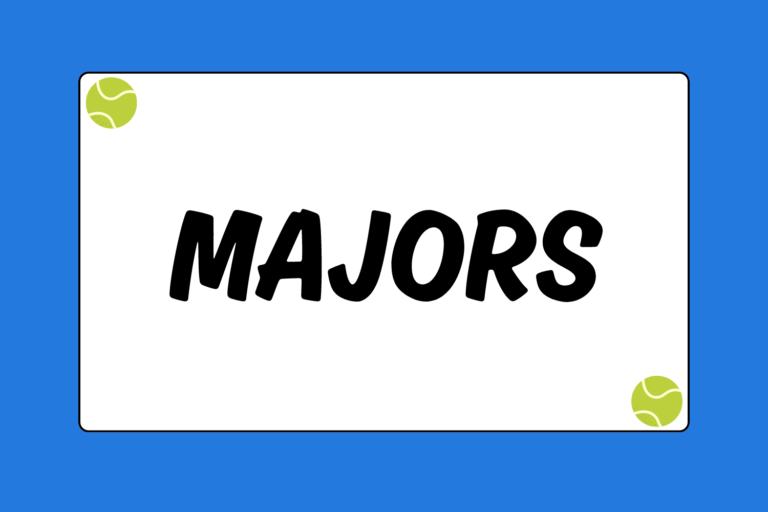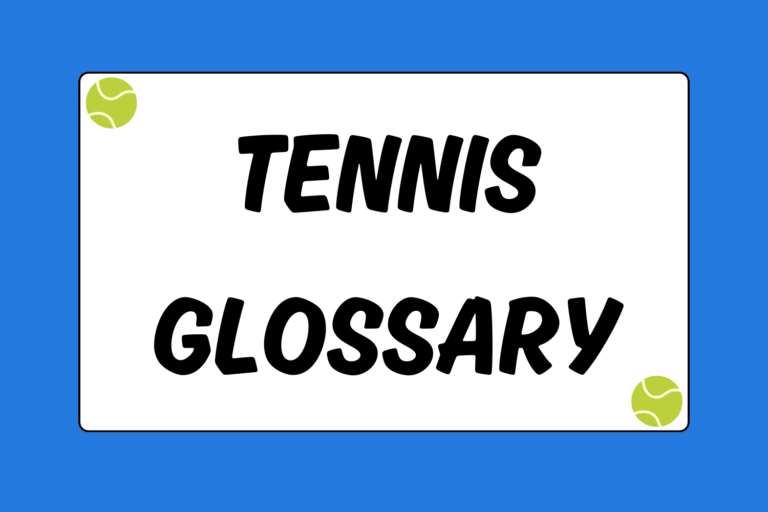At the advanced level, the athletic and technical aspects of tennis are only half of the battle—the other half requires mental toughness and the ability to execute a suitable strategy for the specific situation. This latter side of the game is often under-practiced as players tend to channel all or most of their energy towards improving technique, strength, and fitness.
Reaching a new level of play can be achieved off of the court—and sometimes, it is the one thing standing between a good player and a great player. It is important to take the time to evaluate yourself as a player in all aspects of the sport in order to have a better understanding of your strengths and weaknesses on the court. By analyzing the different parts of your game, you can get a better understanding of yourself as a tennis player and how to take your game to the next level.
This guide is a step in the process of self-evaluation. All it takes is a sheet of paper, or player log if you have one, a pen or pencil, and 10-15 minutes of your time. Rate yourself on a scale from 1-10 for specific components in the following four categories: mental approach, strategy and tactics, physical ability, and technical skill (a 10 means you have perfected the skill, 1 implies that you currently struggle and need improvement in that area).
The Mental Approach to Tennis
Rate yourself in the following areas to determine the strength of your mental game:
- Determination: Do you play hard till the end of each match? Do you give 100% effort on almost every point? Or do you frequently want to give up?If you have the tendency to give up when the going gets tough, give yourself a 1. If you are give it your best on every point, give yourself a 10.
- Ability to handle pressure: Are you able to consistently stay calm and in control throughout the duration of a match, and more importantly, during high pressure situations?A rating of 1 means you are frequently overcome with nerves and emotions; a 10 is awarded for Roger Federer-like nerves of steel and the ability to thrive under pressure.
- Confidence: Do you remain confident even when playing a statistically superior or higher ranked opponent? Do you get discouraged when playing someone who is favored to beat you?A 1 means you take the rankings to heart and assume defeat, while a 10 implies you step into every game like you are favored to win.
- Priorities: How well are you able to focus on winning more often than the fear of losing?Give yourself a 10 if your focus is on winning every point and the fear of losing doesn’t cross your mind or distract you.
- Emotional Control: How capable are you of managing nerves and emotions that occur before and during games?Do nerves heavily and negatively impact your level of play? If so, rate yourself a 1.
- Focus: How capable are you in focusing on the task at hand?Give yourself a 1 if you are easily distracted by things that are out of your control (such as wind, noise, and opponent’s reactions). Give yourself a 10 if you can remain focused on the point being played.
- Dealing with loss: How do you handle defeat? Do you sulk and worry about the result, or do you bounce back quickly after a loss?Give yourself a 1 if you almost always let a loss get the best of you; a 10 means you take each defeat as a chance to improve your game so that you won’t lose the next time.
A player with a firm grasp on this side of the game should score at least in the high 50’s. If you are score in the 30’s or below, your mental game may be preventing you from reaching the next level.
Now that you have completed the mental approach portion of the evaluation, take some time to look over your scores to see what you do well, and more significantly, where you score the lowest and therefore what areas you need to work on.
The Strategic Component of Tennis
The ability to execute the right strategy in a game-time situation is key for any tennis player. Using the same scale from 1-10, rate tactical capabilities for each of the following questions.
- Shot choice: How comfortable are you in knowing which shots to play and when to play them?Give yourself a 1 if you usually hit the ball without clear purpose; a 10 if you frequently hit the right shots at the right time.
- Interpreting your opponent: How well do you read your opponent’s game? Are you always a step behind knowing where your opponent is going to hit the ball?If the latter part of the question rings true, give yourself a 1. If you are able to pick up on your opponent’s pattern and predict where he or she is going to hit the ball under different circumstances, award yourself a 10.
- Adapting: Do you effectively change your game to exploit the weaknesses of your opponent?Give yourself a 10 if you often take advantage of your opponent’s weakness(es) to further your own game.
- Disguising your own weakness: Are you able to hide your own weaknesses in game time situations?If you find your opponents can quickly catch on to and exploit your weaknesses, give yourself a 1.
- Body awareness: How aware are you of your positioning on the court?If you consistently lose track of where you are positioned on the court, give yourself a 1. If you are always aware of your court position and understand a neutral, offensive or defensive situation, give yourself a 10.
- Versatility: Do you utilize different strategies for different types of players?If you only have only one go-to strategy or no strategy at all, you’re a 1. If you take the time to develop a strategy for each type of player you face, award yourself a 10.
- Ability to adjust: If your “A-game” is a little off, how capable are you of switching tactics to implement a new strategy of play?If you are able to adapt when things aren’t going your way, and still find ways to win, give yourself a 10.
Using the right strategy against an opponent is a valuable tool for any tennis player. At the advanced level, strategy will often affect the outcome of a match. The player that best adapts to their opponent will have a better chance at pulling out a victory.
If you scored in the high 50’s for this section, you probably have a strong grasp on the strategic aspect of tennis, but if you are scoring in the 30’s, this is an area of weakness for you as a player.
The Physical Component of Tennis
Rate yourself using the scale from 1-10 to see where you stand in the following categories for physical and athletic capabilities.
- Endurance: How is your stamina? How well do you handle long, grueling matches that go deep into the third set?If you are exhausted and drained after the first set, give yourself a 1. If you consider yourself a third set player, pick up a 10.
- Speed: How is your speed? Are able to quickly get to balls returned to different areas of the court?If you frequently find yourself getting to shots too late in the point, you’re probably a 1.
- Reflexes: Are your reflexes sharp? Are you able to adapt to shots of different speeds?A 10 goes after each ball and reacts well to different shots and speeds.
- Coordination: How is your hand-eye coordination? Are you seeing the ball clearly and consistently? Do you make solid contact with your strokes?If you struggle to make consistent contact with the ball, give yourself a 1, but if you see the ball clearly and often strike in the center of the racquet, add up 10 more.
- Agility: How agile are you on the court?Tennis requires players to be fast over short distances, with the ability to move in multiple directions using explosive, quick steps. Give yourself a 1 if you find yourself off balance, a 10 if you can get to balls and change direction quickly.
Tennis is a physical sport. The better shape you are in, the more likely you’ll last for three grueling sets. There are seven main categories in this section, so once again, analyze your answers for each individual category, and then tally up your score for the section as a whole. A score in the 40’s reflects a strong physical game; a score in the 20’s reveals you need to get into better shape to stay in the game.
The Technical Component of Tennis
Technique is a key component to success. Rate your own technical game using the following prompts.
- Mechanics: Are there flaws in your mechanics? Are you capable of repeating the same strokes consistently in terms of swing motion, preparation for the shot, and contact point?If your mechanics are causing you injury or you are having difficulties using the right techniques, give yourself a 1. If your mechanics are generally flawless and can be consistently produced throughout a match, give yourself a 10.
- Footwork: How is your footwork around the court? Are you taking the right path to the ball? Are you able to sprint to the ball with time to prepare for the shot using quick steps?If you find yourself off balance and behind the play for a majority of the points, give yourself a 1.
- Positioning: Are you usually in the right location to hit different types of shots from different positions on the court?If you find yourself out of position for nearly every ball rate yourself a 1. If you are usually get into position with time to spare, award yourself a 10.
Good technique is essential in the game of tennis, and the right mechanics, footwork, and court positioning often determines the match winner. Look at each item individually, and then tally up the total for the whole section. A score of 24 or above means that you are mechanically sound; a score below 20 indicates that you need to improvement in this area.
Analyze Your Game
The ability to pick apart your own game and analyze your own strengths and weaknesses as a player is one of the hardest aspects of the sport. How can you improve if you do not know what you need to improve? How can you understand the type of tennis player you are without analyzing your style of play? If you do not understand what poses the greatest challenges for your game it will be difficult to get to the next level.
By taking the time out to evaluate yourself as a tennis player, you have just improved your game without stepping foot on to the court. Now it’s time to put that to good use.





